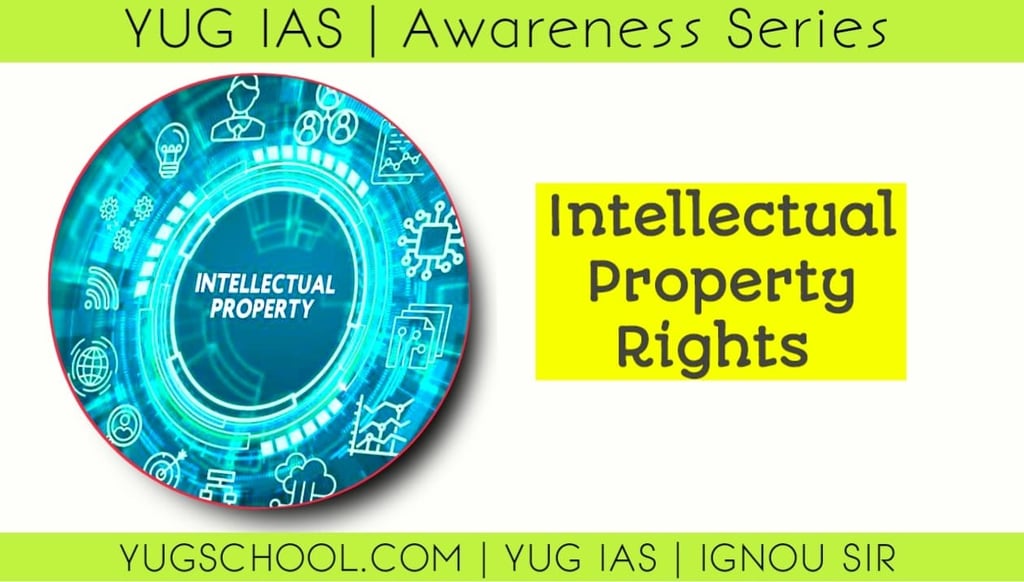Issues relating to Intellectual Property Rights
Intellectual Property Rights (IPR) encompass a complex and multifaceted area of law. Here's a breakdown of some of the most important issues and challenges surrounding IPR
GENERAL STUDIES 3


encompass a complex and multifaceted area of law. Here's a breakdown of some of the most important issues and challenges surrounding IPR:
1. Piracy and Counterfeiting
Widespread Problem: The infringement of intellectual property rights through piracy (unauthorized copying of copyrighted works) and counterfeiting (producing fake versions of trademarked goods) is a massive global problem. This causes huge economic losses for creators, innovators, and businesses.
Online Piracy: The internet has made piracy far easier. People can access and share movies, music, software, and other protected works illegally at a massive scale.
Counterfeit Goods: Fake products range from luxury items to essential medicines, posing safety hazards and undermining legitimate industries.
2. Enforcement Difficulties
Jurisdictional Challenges: IPR laws can vary significantly between countries, making it difficult to enforce rights across borders, especially online.
Cost and Complexity: Enforcing IPR can be expensive and time-consuming, particularly for smaller businesses and individuals.
Rapid Technological Change: The pace of technological change outstrips that of legal systems, making it hard to stay ahead of new methods of infringement.
3. Balancing Protection and Access
Overly Broad Protection: IPR laws intended to protect creators shouldn't stifle innovation or limit reasonable access to knowledge and information. Striking the right balance is crucial.
Public Interest: Consider the public interest in accessing affordable medicines, educational materials, and technological advancements.
Fair Use and Copyright Exceptions: Copyright laws often allow "fair use" for specific purposes like research, commentary, or education. This balance is delicate and often debated in courts.
4. Patent Trolls
Exploitative Tactics: Patent trolls are entities that acquire patents mainly to sue companies for alleged infringement, rather than to create products. This can hinder innovation and cost businesses unnecessarily.
Abusive Litigation: Patent trolls can file lawsuits with weak infringement claims, hoping for quick settlements out of court.
5. Global Trade and IPR
IP Provisions in Trade Agreements: Trade agreements often have provisions designed to strengthen IPR protection internationally, leading to controversies about their effects on developing countries and access to essential goods.
Developing Countries: Some argue that strong IPR systems can hinder access to affordable medicine and technology in developing nations. Others say it's needed to attract innovation and investment.
6. Technology-Specific Challenges
Software and AI: Determining the scope of protection for software and inventions created by artificial intelligence systems raises complex questions.
Open Source: The interaction between open-source licensing models and traditional IP protection is a nuanced area under debate.
Data Ownership: Who owns the rights to massive datasets used to train AI systems? This is increasingly important as AI becomes ubiquitous.
Addressing These Issues
Tackling these issues in IPR requires a multi-pronged approach, including:
International Cooperation: Stronger coordination between countries is needed to address cross-border infringement.
Effective Enforcement: Governments must allocate resources and develop effective strategies to combat piracy and counterfeiting.
Balanced Laws: Laws must protect creators while considering the public interest and allowing for reasonable use and innovation.
Education and Awareness: Raising awareness about IPR among consumers and businesses is crucial to fostering a culture of respect for intellectual property.
Let me know if you'd like to explore any of these issues in more detail!
